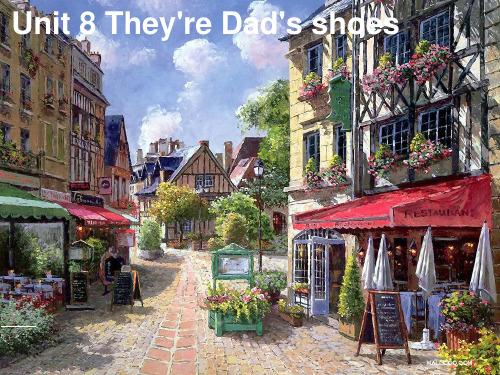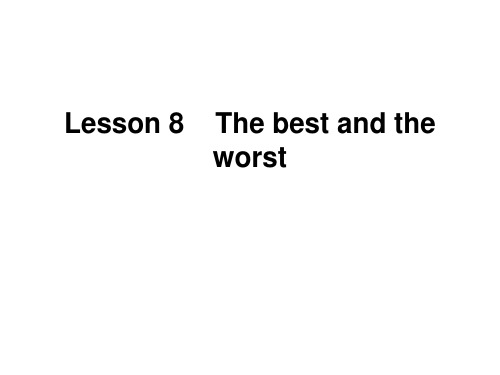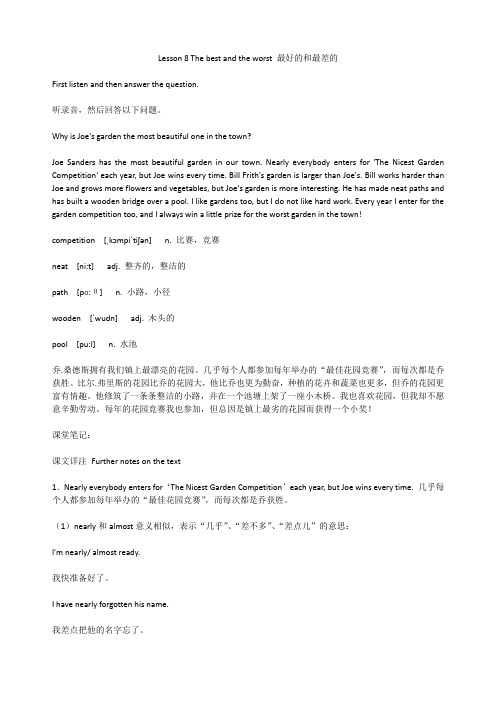新概念8
- 格式:doc
- 大小:36.50 KB
- 文档页数:4




Lesson 8 The best and the worst 最好的和最差的【课文讲解】1、nearly和almost 意义相似,表示“几乎”、“差不多”、“差点儿”的意思。
I have nearly forgotten his name. 我差点把他的名字忘了。
I’m nearly/almost ready. 我快准备好了。
enter for 报名参加(各种竞赛,考试等活动)win(won,won)v. 赢①vi. 赢I win. I lose. (输了)②vt. 赢得……win something 后面往往是奖品,不能接对手I win the book. I win the gold cup. win a prize 赢得了一个奖win a prize for…因为……而获奖defeat [dɪ'fit]战胜,击败+对手I defeat you.4、make 和build在这里是同义词,“修建,建造”。
make 的词义比较笼统、广泛,可解释为“做、作出、制造”等,而build主要限于建筑业,指“建造,建设,盖房子,修筑(桥梁)等”Have you made the skirt by yourself?They have made a road along the river.形容词和副词的比较级和最高级比较级相当于汉语中“比……更……”这种句型,最高级则表示在某个范围“最……”的概念。
最高级在使用时前面通常要加定冠词the,并有一个短语或从句限定其范围。
1、比较级和最高级的构成:①单音节词和少数双音节词在词尾加-er,-est,以辅音加-y结尾的词变-y为-i,再加-er,-est.②以-e 结尾的词加-r,-st.③以一个辅音字母结尾的单音节词要双写最后一个字母,再加-er,-est.④三个或者是三个音节以上(多音节),比较级的构成: more+原级;最高级的构成: the most+原级.有一些双音节词既可在单词结尾加-er,-est,也可与more/less 和most/least 连用,如narrow['næro]狭窄的,clever,common ['kɑmən]普通的;常见的,pleasant等。


Lesson 8 The best and the worst 最好的和最差的First listen and then answer the question.听录音,然后回答以下问题。
Why is Joe's garden the most beautiful one in the town?Joe Sanders has the most beautiful garden in our town. Nearly everybody enters for 'The Nicest Garden Competition' each year, but Joe wins every time. Bill Frith's garden is larger than Joe's. Bill works harder than Joe and grows more flowers and vegetables, but Joe's garden is more interesting. He has made neat paths and has built a wooden bridge over a pool. I like gardens too, but I do not like hard work. Every year I enter for the garden competition too, and I always win a little prize for the worst garden in the town!competition [ˌkɔmpiˈtiʃən] n. 比赛,竞赛neat [ni:t] adj. 整齐的,整洁的path [pɑ:θ] n. 小路,小径wooden [ˈwudn] adj. 木头的pool [pu:l] n. 水池乔.桑德斯拥有我们镇上最漂亮的花园。
新概念starter B unit8一、课堂导入:女生都是爱漂亮的,你也有很多好看的衣服,但是你知道这些漂亮的衣服用英语怎么说吗?我们今天就一起来学学吧!新课内容:一、单词Dress 连衣裙Jacket 夹克衫Jeans 牛仔裤Shoe 鞋子Skirt 裙子Sock 袜子Trousers 长裤Coat 外套Scarf 围巾Touch 碰触Dragon 龙Drum 鼓Tree 树Truck 火车Dream 梦;梦想二、句型1.特殊疑问句以特殊疑问词开头,对句中某一成分提问的句子叫特殊疑问句。
常用的疑问词有:what 、who 、whose 、which 、when 、where 、how 、why等。
特殊疑问句有两种语序:1.如疑问词作主语或主语的定语,即对主语或主语的定语提问,其语序是陈述句的语序。
例:Who is singing in the room?Whose bike is broken?2.如疑问词作其他成分,即对其他成分提问,其语序是:特殊疑问词+一般疑问句【特殊疑问词+be/助动词/情态动词+主语+谓语】例:What does she like?What class are you in﹖Where are you from﹖What time does he get up every morning﹖How do you know﹖注意:回答特殊疑问句时,不能用yes / no,即问什么答什么,尤其是简略回答。
如:Who is from Canada﹖Helen (is).Where's the restaurant﹖Near the station.Why do you like koalas﹖Because they are cute.常用的特殊疑问词:Who谁——Whose谁的(加se)Why为什么 When什么时候 Where在哪里 Which哪一个What什么 ( What time什么时间 What colour什么颜色)How怎么样(How many多少{数量} How much多少钱{价格},多少(对不可数名词进行提问)How long多长 How often多少次 How big多大 How heavy多重{重量} How far多远{路程}三、语法名词复数规则1.一般情况下,直接加-s,如:book-books, bag-bags, cat-cats, bed-beds2.以s. x. sh. ch结尾,加-es,如:bus-buses, box-boxes, brush-brushes, watch-watches 3.以“辅音字母+y”结尾,变y为i, 再加-es,如:family-families, strawberry-strawberries4.以“f或fe”结尾,变f或fe为v, 再加-es,如:knife-knives5.以“o”结尾,有生命的加-es,如:potato-potatoes,hero-heroes 无生命的加-s,如photo-photos6.不规则名词复数:man-men, woman-women, policeman-policemen, policewoman-policewomen, mouse-mice child-children,foot-feet,tooth-teeth,fish-fish,people-people, Chinese-Chinese, Japanese-Japanese名词单复数同形记忆口诀以下这些名词单复数同形fish 鱼,deer 鹿,sheep 绵羊,works(工厂),means 手段,Swiss 瑞士人,Chinese 中国人,如This is a steel works. 这是一家钢铁厂。
新概念英语二册Lessons 8课后练习答案新概念英语第二册第8课词汇学习 Word studyenter(1)vt.,vi. 进入:Joe entered the room quietly.乔悄悄地走进了房间。
Always knock on the door before you enter.进入前要先敲门。
(2)vt.,vi. 参加,加入:We've entered into an agreement.我们已达成一项协议。
He soon entered their conversation.他很快便加入了他们的谈话。
(3)enter for是"报名参加"的意思:She entered (her name/ herself) for the mathematics competition.她报名参加数学竞赛。
He entered his son for the English examination.他让儿子参加英语考试。
every 构成的合成词every和one, body, thing能够构成复合不定代词everyone, everybody和everything。
它们一般都写成一个词。
everyone和everybody一般能够替换使用,后面的代词既能够用单数,也能够用复数,但它们本身均被视为单数:Everyone/ Everybody knows what he has to do.每一个人都知道自己必须做什么。
Everyone/ Everybody knows what they have to do.每个人都知道自己必须做什么。
Everything is going well.一切都很顺利。
与every一样能够构成这类合成词的单词还有some, any和no。
新概念英语第二册第8课练习答案 Key to written exercises1.关键句型练习答案A 1 Mary's handwriting is worse than Jane's.2 Caroline's handwriting is worse than Mary's and Jane's.3 Caroline's dress is/ was more expensive than Jane's.4 Mary's dress is/ was more expensive than Jane's and Caroline's.B …has the most beautiful garden in our town…'The Nicest Garden Competition'…garden is larger thanJoe's…works harder than Joe and grows more flowers and vegetables…garden is more interesting…for the worst garden in the town!D 1 in 2 of 3 of 4 in2.难点练习答案A 1 believes 2 was 3 triesB Sentences 2, 3 and 53.多项选择题答案1 d2 b3 b4 a5 c6 c7 b 8 b 9 a 10 d 11b 12 b。
1.填空:
将来完成时:S+
过去完成时:S+
before long:
期待某事:
期待做某事:
召开会议:________________________
巨大的:________________________、________________________、________________________
高标准:________________________
奥林匹克运动会:________________________
1. The child c _ _ _ _ _ _ _ _ _ _ talks in class.
2.They will h_ _ _ a meeting on Monday.
3.London is the c _ _ _ _ _ _ of England.
4.She is a designer, she d _ _ _ _ _ _ _ this beautiful house.
5.They will have a football match in this s _ _ _ _ _ _ .
6.The g _ _ _ _ _ _ _ _ _ controls the price.
2.将来完成时专项练习
1. By the end of this year ,I ____enough money for a holiday
A will save
B will be saving
C will have saved Dhave saved
2. I hope her health _______greatly by the time we come back next year.
A improves
B improved
C will be improved
D will have improved
3. “Are you going to lilei”s birthday party?
“Yes.By then I ______my homework..”
A had finished
B will have finished
C would have finished
D finished
4. I suppose by the time I come back in ten years’ time all these old house______down.
A will have been pulled
B will be pulling
C will have pulled
D will be pulled
5. I hope that they ______the road by the time we come back.
A will have repaired
B would have repaired
C have repaired
D had repaired
6. We _____ four thousand new words by the end of last year.
1.had learned B. have learned
C. learned
D. will have learned
7. Helen _______ her keys in the office so she had to wait until her husband ______home.
1.has left, comes B. left, had come
C. had left, came
D. had left, would come
8.I lost the book I ________.
1.have bought B. bought
C. had bought
D. had been bought
9. The bus had gone when I _____ at the bus stop.
1.have arrived B. arrived
C. had arrived
D. am arriving
10.Tom ____ of visiting his grandmother, but the bad weather made him change his mind.
1.has thought B. thought
C. had thought
D. had been thought
11.He _____ more than 5000 English words when he entered the university at the age of 15.
A. has learned
B. would have learned
C. learned
D. had learned
12.I ___________got to the bus stop when the bus started.
A Hardly B. no sooner
C.had hardly
D.had no sooner
13. He __________ reached home _______ his dog began barking.
A.hardly, than
B.had no sooner, when
C.hardly, when
D. had no sooner, than
3.翻译:
1. 等到你今晚回来,我就会把墙粉刷完。
(will have done)
2. 我妈妈说她盼望着能早点见到你。
(look forward to)
3. 明天的这个时候你将已经到达纽约。
4.不久之后,他将忘记所有的事情。
(matter)
5. 在这学期的最后,我们将学完48课。
(by the end of this term)
6.明年你回来的时候我已经读完这本书了。
(finish)。